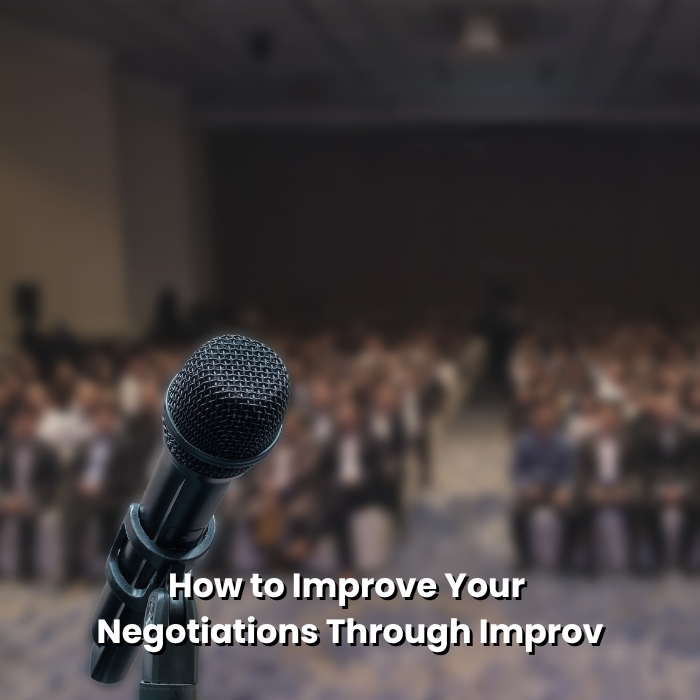
Do Biases Sabotage Your Negotiations? Part II
We’re all biased and we carry these biases (whether conscious or not) into all our interactions. These biases can sabotage your ability to get better outcomes in negotiating your life. They interfere with your perspective-taking ability and cloud your judgment. It’s important to elevate your awareness about the inherent biases you bring to the table so you can negotiate with greater clarity and increase your influence and persuasive abilities. Last week we explored the range of Personal Biases. Now let’s turn to other types of bias that are likely showing up in your life.
Information Bias
How we receive information can impact our perception and beliefs. Two primary information biases that show up are (i) Information Presentation Bias and (ii) Information Availability Bias. You can use these biases to your advantage. Beware, however, that you are not falling victim to the power of these information biases being used against you.
Information Presentation
How information is presented to us can profoundly impact on our receptivity to the information. The advertising industry is a multi-billion-dollar industry for this reason. How we see things affects our actions (from decisions, to purchasing power, to voting and beyond). This is why large organizations or governments trying to push through a particular agenda will use fancy, glossy, high-end materials with specific language triggers etc. Be careful to ensure that your decisions are based on actual meaningful content as opposed to slick presentation tactics.
Having said that, at the other end, it will serve you to get intentional about how you’re presenting information to the other party in your negotiations. Consider whether someone is a visual, auditory or kinesthetic learner and cater to their style(s) in presenting information that you want to ensure they consider.
Information Availability
Likewise, beware that you are getting access to all relevant information in any negotiation. It is easy to skew perceptions through strategic use of statistical or other data presented. What is omitted is often as (or more) important than what is presented. Consider and question the availability of all potentially significant information before making decisions. Pay attention to what the other party is making available and what may be conspicuously absent.
Tied to information availability is Misinformation. Some negotiators will disseminate misinformation to skew the balance in their favour. In my view, this is never appropriate. Trust is a cornerstone of effective negotiations. Breaking that trust can be irreparable. It is easier to lose trust than to build it. Ultimately our integrity needs to be our trademark. Using misinformation is out of alignment with bargaining in integrity.
Anchoring
Anchoring is when we set the expectations for a particular negotiation by starting with a strong position at the extreme edge of the range of possibility. If we’re a purchaser, for example, it serves to anchor the negotiation with a low starting price to lower the other party’s expectations about what is reasonable or achievable. If we’re the vendor, we’d want to anchor high out of the gate if possible. While it seems inauthentic to proceed in this way, studies continue to affirm that anchoring can change the other party’s beliefs about the nature of an appropriate agreement and so is effective in many negotiations.
Fixed-pie Bias
While some consider this to be a belief system rather than a bias, to some extent our beliefs are our biases. Our predisposed views of the world affect our perceptions and perspectives and so become biases that impact our negotiations. Many people suffer from fixed-pie bias. They see the world and each negotiation as a fixed pie of availability where they need to ensure they get their fair ‘slice of the pie’. This is to be contrasted with an abundance perspective where one believes there are potentially infinite possibilities available as solutions to any issue and seek to find the highest good for all.
Framing bias
How something is framed can significantly impact on how it is received. Being mindful of your framing can increase your ability to influence and persuade. For example, framing something as a win versus loss will invariably be better received. If someone is earning $100,000 and sought an increase to $150,000, framing a $120,000 counter-offer as an increase of $20,000 will be better received than presenting it as $30,000 less than they’d asked for. The power of framing should not be under-estimated.
Sunk Cost bias (aka Irrational Escalation of Commitment)
When we’ve sunk money into a particular project, person, investment, etc., studies show that we’re less likely to walk away, but instead are more likely to continue to throw more money on the table as we don’t want to see the money spent to date as a loss. The same holds true with sunk time costs. The more time we’ve invested, the less likely we are to walk away. This can cause us to bargain long after it makes sense to do so. Raising your awareness about this bias and its potentially dangerous impact can be a powerful game-changer.
Loss Aversion Bias (aka Prospect theory)
For the same reasons that we don’t like to acknowledge our lost investments (noted above under ‘Sunk Cost Bias’), studies show that we tend to have higher aversion to losses. In other words, we fear loss and avoid losses more than we try to make profits. For example, most people would rather avoid losing $2,000 than potentially making $3,000. As a result, how we frame offers can create a bias (either pro or con) depending on whether it’s framed as a loss avoidance or gain.
Halo & Horn effect
Let’s face it … we tend to make snap judgments in our society. Beware though that these first impressions on meeting someone can have dangerous side-effects. The halo effect is when a positive first impression of someone leads us to view them more favourably and cast their entire character in a more favourable light, ignoring or discounting negative attributes. By contrast, the horn effect is when a negative first impression causes us to view them more negatively, failing to see the positive attributes. This bias is particularly problematic in a society where we over-value ‘attractive’ people and ascribe competence and other success traits to them that may not be warranted and conversely we under-value so-called ‘unattractive’ people and their skills and potential contributions.
Narrative Fallacy
We naturally like stories. Humans have a long history of storytelling. As a result, we find them easier to relate to and make sense of. Pay attention though to getting sucked in to less desirable outcomes simply because they came packaged with a better story. At the other end, however, it’s valuable to remember that presenting your position with a good story will get better buy-in.
Hindsight Bias
Hindsight bias is the tendency to look back on events and believe we accurately predicted (or could have predicted) the outcome. This sounds innocuous, but the danger lies in our corresponding belief that our judgement is better than it is. As a result, we’re less critical of our decisions going forward, which can cause poor decision-making.
Contrast Effect
When presented with contrasting options, most people will be inclined to choose the more attractive offer. In other words, rather than simply offering $30,000 in a deal, if presented as either $30K now of $10K/year spread over 3 years, the lump sum will likely seem more attractive than it would have on its own. Presenting a contrast offer that makes your desired outcome look more attractive can create a powerful bias in your favour.
False Conflict (aka Illusory conflict)
False conflict arises where one perceives a conflict that doesn’t actually exist. If we expect or anticipate a conflict or push-back, it can skew our perception so we believe we’re in a conflict situation, when we’re not. This will adversely impact how we show up and our ability to achieve positive outcomes.
Winners’ Curse
Winners’ curse rears its head when we settle quickly and feel uncomfortable because it seemed to come too easily. We don’t trust easy and have been conditioned to believe good things have to be hard-earned. Ironically, we end up feeling disappointed and resentful about great deals sometimes if our perception is that it came too easily.
Reactive Devaluation
Similar to Winner’s curse, Reactive Devaluation is when we devalue concessions given by other party simply because they were given.
Herd Mentality
Not to be confused with herd immunity, Herd Mentality is when we blindly copy what others are doing. This shows up with desires to follow famous people. It also shows up when people are drawn to follow perceived popular opinion rather than making informed individual choices. These biases can have a strong pull and can skew independent judgment and clarity of thought.
And so we come to the end of our review of popular or common biases that may be holding you back from your best outcomes. Did you identify your bias poisons? If so, congratulations! You’re well on your way to overcoming their adverse impact in your negotiations.
- Negotiate a Boost to Your Immune System - January 20, 2025
- Negotiating Tips from a Former Hostage Negotiator Isaac Betancourt - January 16, 2025
- How to Improve Your Negotiations Through Improv - January 15, 2025






